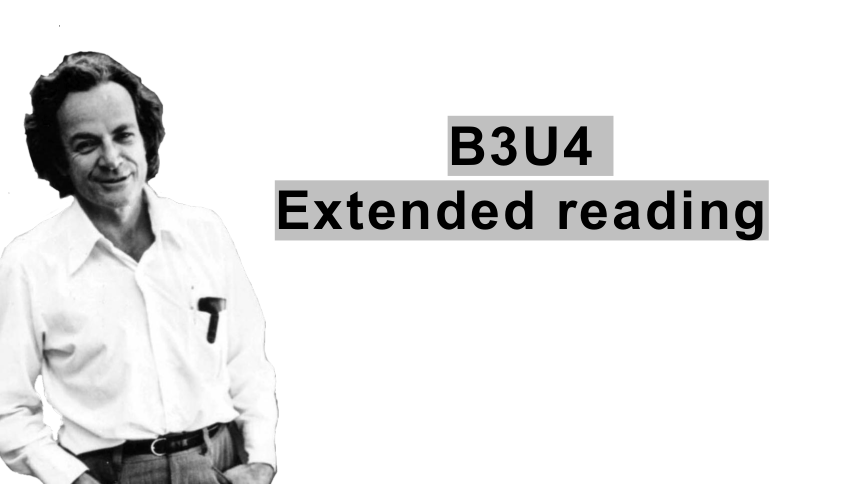(
课件网) B3U4 Extended reading Science is the belief in the ignorance of experts. Richard Feynman 理查德·费曼 Richard Feynman, in full Richard Phillips Feynman, (1918—1988), American theoretical physicist who was widely regarded as the most brilliant, influential, and iconoclastic(打破旧习的) figure in his field in the post-World War II era. Manhattan Project Feynman diagrams Feynman Technique Nobel Prize winner A LECTURE’s structure Prologue 开场白 Body Summary ——— raise a question ——— answer a question ——— give some advice Global reading Prologue-Para 1&2 Body-Para 3-6 Summary-Para 7 Introduction to the topic: What is the value of science Three values of science: The value of creation The intellectual enjoyment The freedom to doubt Feynman’s advice: The duty of scientists When I was young, I thought science was _____. During the war, I found science was obviously_____. Is there some _____ involved in science useful serious evil Progress is the fruit of _____of thought Doubt is _____ and discussed freedom welcomed Read paras 1-3 and answer: 1.Why did Feynman ask the question “ Is there some evil involved in science” 2.According to Feynman, who should be blamed if the power of science is used to do something bad And why Scientific knowledge is an enabling power without instructions on how to apply it. If the science is used to do something bad, it is not the science, but the man misusing it that should be blamed. The destruction of people and the risky future of the world were caused by the atomic bombs he had worked on. Close Reading Close Reading Read para 4 and answer: According to Feynman, where does the intellectual enjoyment come from Intellectual enjoyment comes from the process of exploring and discovering mysteries one after another. Read paras 5-7 and answer: 1.When a scientist doesn't know the answer to a problem, what changes would his mind experience 2.How was our freedom to doubt born 3.What rhetorical device is used in the last paragraph What effect does it have Close Reading Read paras 5-7 and answer: 1.When a scientist doesn't know the answer to a problem, what changes would his mind experience Not knowing the answer to a problem Having an idea to the result Being sure of the will-be result experiencing ignorance feeling uncertain being still in some doubt Problem: Attitude: Close Reading Read paras 5-7 and answer: 2.How was our freedom to doubt born 3.What rhetorical device is used in the last paragraph What effect does it have Freedom to doubt was born out of a deep and strong struggle against authority in the early days of science. The parallel structure is applied with the use of 3 to-infinitives. It has a powerful effect to make the reader be aware of the importance of freedom to doubt. Close Reading Feynman believes that of all science’s many values, the greatest must be the freedom to doubt. How do you understand this Give examples to support your ... ...

